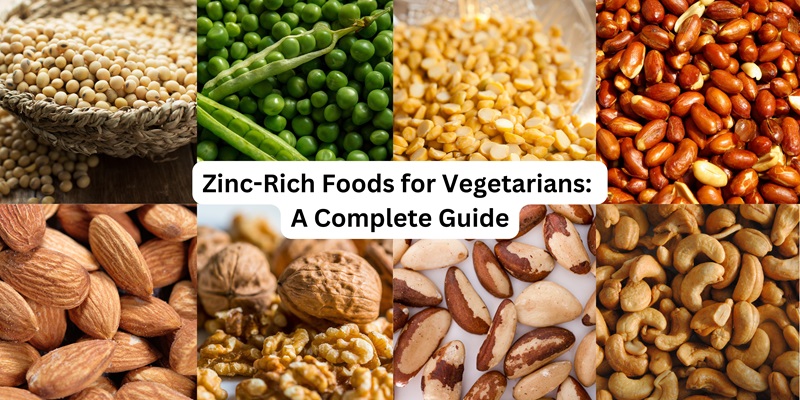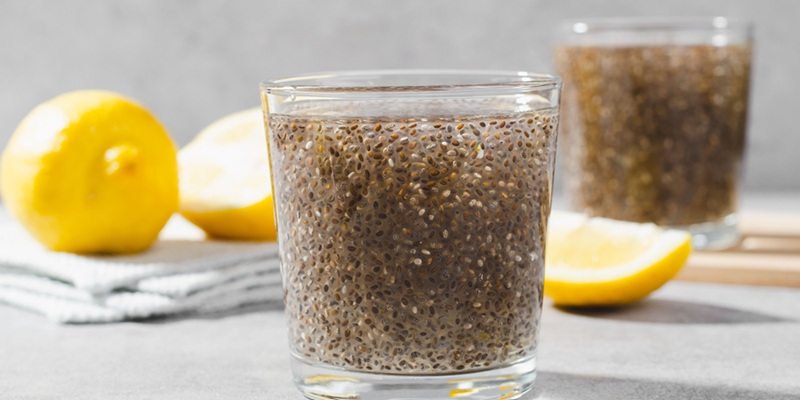Zinc is an important mineral that helps your body in many ways. It supports your immune system, helps in healing wounds faster and plays a major role in making DNA and growing cells.
Even though zinc is so important, many people don’t talk about it enough. Because zinc is mostly found in animal-based foods. So, vegetarians need to be careful to get enough zinc in their diet.
To all those who want to meet their zinc needs without giving up a vegetarian diet, no need to worry—there are many plant based foods that are rich in zinc.
In this blog, we’ll talk about why zinc is important, how much you need every day, the challenges vegetarians face in getting enough zinc, and a list of plant-based foods rich in zinc. Let’s get started!
Why Zinc Matters?
Zinc is very important for keeping your body healthy. Here are some of its key functions:
Immune Support: Zinc helps the immune system fight against infections and illnesses.
Wound Healing: It helps in repair tissues, making wounds heal faster.
Enzyme Function: Zinc supports over 300 enzymes that help with digestion, metabolism and other important processes.
Growth and Development: It is necessary for proper growth in children and teens.
Skin Health: Zinc keeps your skin healthy by reducing inflammation and helping make collagen.
Given its extensive role in the body, it’s clear why getting enough zinc every day is so important.
How Much Zinc Do You Need?

Challenges for Vegetarians
The main challenge for vegetarians with zinc is that plant foods don’t always allow the body to absorb zinc well. Many plant foods have something called phytates, which can stop zinc from being absorbed. Foods like beans, nuts, seeds, and whole grains have both zinc and phytates, which can make it harder for your body to use the zinc.
But don’t worry—there are ways to help your body absorb more zinc from plant foods. Soaking, sprouting and fermenting these foods can lower phytates and make easier to absorb zinc. Eating zinc-rich foods with foods high in vitamin C can also help your body absorb zinc better.
Top Zinc-Rich Foods for Vegetarians
Let’s explore the best plant-based foods that are high in zinc and how you can add them to your diet.
- Soybeans (4.2 mg of Zinc)
Soybeans are a great source of zinc. They are also high in protein and fiber. You can eat soybeans as tofu, tempeh, edamame or drink soy milk. - Peas (3.8 mg of Zinc)
Peas are rich in zinc, protein and fiber. You can add them to curries, soups or salads for extra nutrition. - Lentils (3.7 mg of Zinc)
Lentils are a common food in vegetarian diets and provide zinc, protein, and fiber. They’re great for making dals, soups, or veggie patties. - Peanuts (3.5 mg of Zinc)
Peanuts have zinc and healthy fats. They can be eaten as a snack, in peanut butter, or added to salads and smoothies. - Sweetcorn (3.5 mg of Zinc)
Sweetcorn contains a good amount of zinc. It can be eaten in salads, soups, or as a side dish, and is also great for grilling. - Pecan Nuts (5.3 mg of Zinc)
Pecans are rich in zinc and healthy fats. You can eat them as a snack, in granola, or use them in baking. - Brazil Nuts (5.3 mg of Zinc)
Brazil nuts are packed with zinc and selenium, which helps your immune system. You can eat them alone or add them to baked goods. - Walnuts (2.7 mg of Zinc)
Walnuts have zinc and omega-3 fatty acids, which are good for your heart. You can eat them as a snack or add them to salads and baking. - Almonds (2.2 mg of Zinc)
Almonds are a good source of zinc, vitamin E, and healthy fats. You can eat them raw, roasted, or in almond butter, and add them to smoothies or desserts. - Cashew Nuts (5.6 mg of Zinc)
Cashews are rich in zinc, healthy fats, and protein. You can eat them as a snack, roasted, or use them in curries and desserts.
These foods are not only high in zinc but also consist other important nutrients, making them great choices for vegetarians.
Conclusion
Zinc is an important nutrient for vegetarians and you can get it from many plant-based foods. By adding legumes, nuts, seeds, whole grains to your meals, you can meet your daily zinc needs and stay healthy. To improve zinc absorption, try soaking or sprouting your foods, and have them with foods high in vitamin C for better results.
With some planning and creativity, it’s easy to get enough zinc on a vegetarian diet. Try the foods and tips listed above, and enjoy a healthy diet that supports your well-being!





